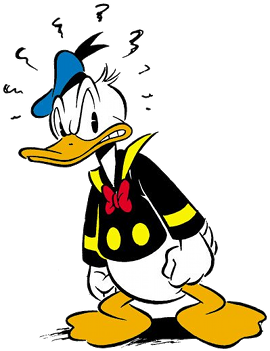Donald Duck
Donald Duck is a cartoon character created by Walt Disney Productions. His first appearance was in the Silly Symphonies cartoon "The Wise Little Hen" on June 9, 1934. Donald is known for his semi-intelligible speech and his mischievous and temperamental personality. Along with his friend Mickey Mouse, Donald is one of the most popular Disney characters and was included in TV Guide's list of the 50 greatest cartoon characters of all time in 2002.
Character[edit | edit source]
Donald Duck is characterized by his white duck feathers, orange bill and feet, and sailor suit with a bow tie. Donald's personality is marked by his short temper, but he is also depicted as being honest, hardworking, and with a strong sense of morality, though he sometimes tries to find the easy way out of a difficult situation. His voice, uniquely characterized by its distinctive duck-like speech, was originally performed by voice actor Clarence "Ducky" Nash until his death in 1985. Since then, Tony Anselmo has been the primary voice of Donald Duck.
Donald's extended family includes his rich uncle Scrooge McDuck, his cousin Gladstone Gander, and his nephews Huey, Dewey, and Louie. Donald has a significant other, Daisy Duck, and occasionally, the series introduces his grandmother Duck Grandma. Donald's adventures range from everyday misfortunes to battles against villains, often alongside Mickey Mouse and Goofy.
Appearances[edit | edit source]
Donald Duck has appeared in more films than any other Disney character, and he was the most published comic book character in the world outside of the superhero genre. Donald's first film appearance was in "The Wise Little Hen," but his breakout role came with "The Band Concert" (1935), which was the first Mickey Mouse cartoon to be produced in color. Donald has starred in over 150 theatrical films and numerous television shows, including his own series, "DuckTales" (1987-1990), which was later rebooted in 2017.
Beyond films and television, Donald is a staple character in Disney theme parks around the world, appearing in many parades and shows. He is also a popular character in video games, comic strips, and comic books, with his own comic book series where he often finds himself on adventures in exotic locations or solving mysteries.
Cultural Impact[edit | edit source]
Donald Duck has had a significant impact on popular culture worldwide. He has been used as a propaganda tool during World War II, and his image appears on a variety of merchandise, from toys and clothing to stationary and electronics. Donald's temperamental nature has made him a beloved character, as audiences find humor and relatability in his struggles and frustrations.
Legacy[edit | edit source]
Donald Duck's legacy is cemented by his status as one of the most iconic and enduring characters in the history of animation. His influence extends beyond entertainment, touching aspects of culture and society around the globe. Donald has received numerous awards and honors, including a star on the Hollywood Walk of Fame in 2004.
| The Walt Disney Company | ||||||||||||||||||||||||||||||||||||||||||||||
|---|---|---|---|---|---|---|---|---|---|---|---|---|---|---|---|---|---|---|---|---|---|---|---|---|---|---|---|---|---|---|---|---|---|---|---|---|---|---|---|---|---|---|---|---|---|---|
* Category
|
This article is a animated character stub. You can help WikiMD by expanding it!
Search WikiMD
Ad.Tired of being Overweight? Try W8MD's physician weight loss program.
Semaglutide (Ozempic / Wegovy and Tirzepatide (Mounjaro / Zepbound) available.
Advertise on WikiMD
|
WikiMD's Wellness Encyclopedia |
| Let Food Be Thy Medicine Medicine Thy Food - Hippocrates |
Translate this page: - East Asian
中文,
日本,
한국어,
South Asian
हिन्दी,
தமிழ்,
తెలుగు,
Urdu,
ಕನ್ನಡ,
Southeast Asian
Indonesian,
Vietnamese,
Thai,
မြန်မာဘာသာ,
বাংলা
European
español,
Deutsch,
français,
Greek,
português do Brasil,
polski,
română,
русский,
Nederlands,
norsk,
svenska,
suomi,
Italian
Middle Eastern & African
عربى,
Turkish,
Persian,
Hebrew,
Afrikaans,
isiZulu,
Kiswahili,
Other
Bulgarian,
Hungarian,
Czech,
Swedish,
മലയാളം,
मराठी,
ਪੰਜਾਬੀ,
ગુજરાતી,
Portuguese,
Ukrainian
Medical Disclaimer: WikiMD is not a substitute for professional medical advice. The information on WikiMD is provided as an information resource only, may be incorrect, outdated or misleading, and is not to be used or relied on for any diagnostic or treatment purposes. Please consult your health care provider before making any healthcare decisions or for guidance about a specific medical condition. WikiMD expressly disclaims responsibility, and shall have no liability, for any damages, loss, injury, or liability whatsoever suffered as a result of your reliance on the information contained in this site. By visiting this site you agree to the foregoing terms and conditions, which may from time to time be changed or supplemented by WikiMD. If you do not agree to the foregoing terms and conditions, you should not enter or use this site. See full disclaimer.
Credits:Most images are courtesy of Wikimedia commons, and templates, categories Wikipedia, licensed under CC BY SA or similar.
Contributors: Prab R. Tumpati, MD

